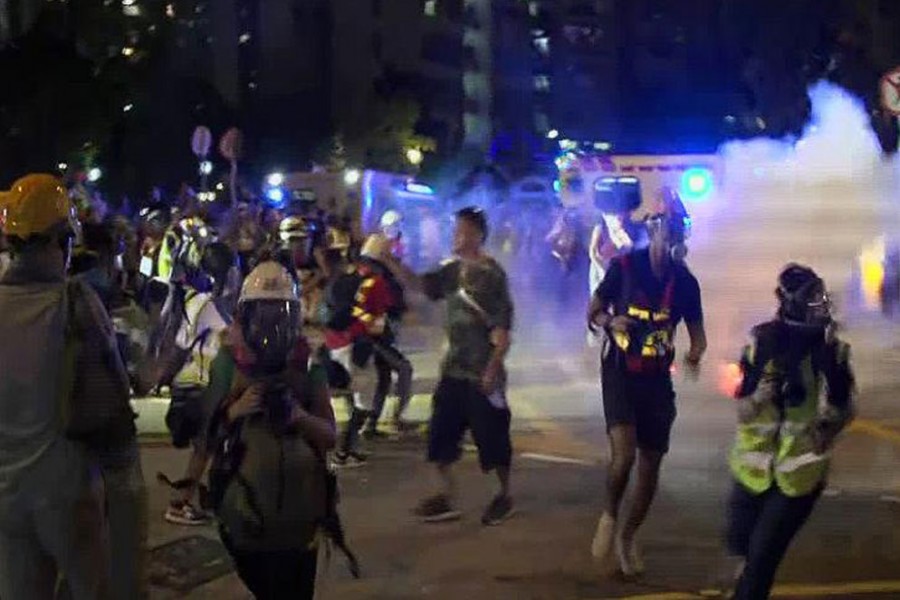Hong Kong, known as Pearl of the Orient, a hub for international trade and finance and a food haven, underwent another bout of pain on Saturday as a large number of radical protesters organised illegal rallies blocking traffic, damaging public property including the government complex, and attacking police with Molotov cocktails and bricks. The beautiful city boasting modern facilities and famed for its order was left with smoke, garbage and chaos after each violent demonstration.
Hong Kong police had objected to the opposition's application for permission for the planned August 31 rally and march to the Liaison Office of Central People's Government in Hong Kong, but unauthorised rallies were still held in several places starting at noon on Saturday, and violent protesters attacked places including the regional government complex and Hong Kong police headquarters.
Hong Kong police alerted residents to mind their safety and reportedly deployed more than 5,000 officers, and water cannons and armoured vehicles in advance.
Around 5 pm, radical protesters gathered at the Hong Kong regional government compound and Legislative Council complex, throwing Molotov cocktails and bricks into the security cordons. Demonstrators attempted to pry open an iron fence outside the government complex with iron rods. They also hurled Molotov cocktails at the police headquarters.
The protesters also damaged traffic lights and railings on Pedder Street and Johnston Road. Some shone laser lights at police officers.
After repeated warnings, police fired water cannons and used minimum forces to disperse the protesters.
On the streets, violent protesters, fully covered in black masks and clothes, armed with dangerous makeshift weapons such as bricks, iron rods and Molotov cocktails, adopted an attack-and-run strategy in their violence against the police.
Even as police officers issued warnings repeatedly, rioters threw bricks and Molotov cocktails at the police. Though they fired tear gases and used water cannons, police officers continued to exercise restraint as they did in previous violent protests.
Rioters also vandalized facilities on the streets, removing trash bins to set up blockades on the street and picking up bricks on the pavements to attack police officers. They even started arson on the streets, burning trash and plastic trash bins and constantly threw objects into the fire.
When black-clad protesters set up road barricades near the subway station of Sheung Wan, they were surrounded by some journalists wearing yellow vests and some ordinary Hongkongers. A female passerby was outraged by what she had seen. "They are just watching like this and doing nothing? Why nobody prevented them from doing this?" she said, referring to the damage the rioters made at the streets.
Later at night, rioters lit fires to block the road near the Hysan Place and started another fire on Yee Wo Street. Hong Kong police had to deploy water cannon again to the site, warning protesters to leave. A huge explosion started a fire near the police headquarters; the blaze even stretched to a neighbouring residential community.
A protester was seen aiming an air gun at the police and another one setting trap to obstruct the police's work. The water cannons drove away protesters and they attacked police but scattered once the police closed in. Some were put under control while being chased away by the police.
Police officers later cleared the mess left behind by rioters at Hennessy Road near the police headquarters as mobs destroyed public facilities.
The unrest including setting fires, hurling Molotov cocktails, blocking traffic continued until late night. As of 11 pm Saturday, protesters continued moving to other districts such as Kowloon and Kwun Tong, disrupting MTR services in Kwun Tong and Tseun Wan.
Andrew Leung Kwan-yuen, president of the Hong Kong LegCo, said Saturday night that he felt sad and disappointed after protesters attacked the LegCo building again. He condemned the protesters for ignoring other people's safety and throwing inflammable objects and bricks.
The Hong Kong government released a statement on its website later Saturday night, condemning the unauthorised violent movements of the radical protesters. The government vowed that local police will perform its duty and the government will continue safeguarding rule of law. It also urged citizens to say "No" to violence and bring the society back to order.
A local resident surnamed Chu told the Global Times that "the situation is worrying."
He said he has foreign friends who are living near the site of rally since their arrival in Hong Kong and after witnessing what happened, their impression of Hong Kong became worse.
"Now the turmoil is likely to further dampen Hong Kong's economy, which is already on a downward trajectory," said Chu.
Mark Yu, a student of the University of Hong Kong, said public order and the rule of law are the two pillars of Hong Kong's success, but radical protesters have trampled on these cornerstones consecutively.
"Every night, every residential community, there are radicals who shouted slogans and harassed the neighbourhood. Today, protesters used Molotov cocktails to attack police, set up roadblocks and set fires, disrupting public order and obstructing traffic, putting ordinary people present in great danger. No society ruled by law in the world can tolerate this," Yu said.


